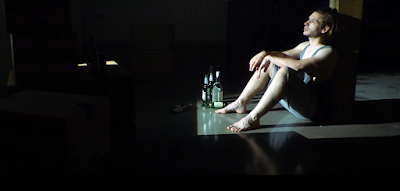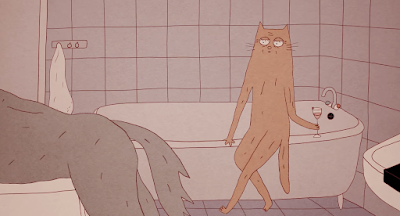by Douglas
Messerli
Steve Grand (lyrics
and music), Jason Knade (director), All-American Boy / 2013 [5 minutes]
[music video]
Gay pop singer Steve
Grand’s first hit brought him major attention, and with good reason. All-American
Boy is a powerful narrative that outlines the experiences of nearly any
young man, not yet sure what being queer is all about, but nonetheless having
desires for the hottest and best- looking boy in his school. For me it was the
senior football captain—who, in fact, may have been gay and offered me the
opportunity, which alas as a high school freshman I was too frightened to
accept, of finding out.
For
Grand it is a handsome straight boy at a party. Sure, he’d brought along his
own girlfriend, but so did Grand; it was required as a cover. So one never knew
for sure, and the way Grand’s “All-American Boy” keeps staring at him, perhaps
it’s just possible that they might, for just one night, find love together.
Grand’s lyrics say
it all. He reports that he chose the title because that was how his father
always introduced his sons, as just “All-American” boys who were members of Boy
Scouts, who worked hard, and received good grades at school.
But in this narrative fantasy, the term
takes on new meaning, as the boy becomes a kind of reiteration of the sexuality
that popular straight boys often imbued in their nonchalant masculinity.
Growing up in the fifties, I remember it well, boys white T-shirts (often the sleeves
rolled up once, or if twice stashed with a pack of cigarettes) and denims,
blonde or light brown hair (I preferred the darker haired and more hirsute
types like the football captain). They stood out as tougher versions of someone
like Tab Hunter, dangerous to approach yet self-conscious about their effect on
someone like me; one had to be careful not to stare too long. But the longing
never left one’s heart.
Grand begins his song with a similar
description:
Ripped Jeans, only
drinks whiskey
I find him by the
fire while his girl was getting frisky, oh
I say we go this
road tonight
He smiles, his
arms around her
But his eyes are
holdin' me, just a captive to his wonder, oh
I say we go this
road tonight
“I needed to do
something to share the ache and share the pain that I've felt for most of my
life. This is the story I wanted to tell. This is who I want to be. I owe that.
I owe that to all the people who have felt this.”
Yet, in the famous chorus of this ballad,
he throws caution to the wind, almost demanding that his fantasy comes true for
once:
“Be my
All-American boy tonight
Where everyday's
the Fourth of July
And it's alright,
alright
And we can keep
this up 'til the morning light
And you can hold
me deep in your eyes
It's alright,
alright
So be my, be my
All-American boy"
And in this song he almost gets his way,
as the boy, his girlfriend, and Grand escape the part in an auto, the boys
getting on well, while the girlfriend becomes peeved; and when they stop to toss what appears
to be a small tennis ball, she drives away by herself, leaving Grand and the man of
his dreams alone.
They trudge down
the dirt path to a small lake which they both know about (this is after all
Wisconsin, where lakes are everywhere). The boy strips and dives in, leaving
the handsome Grand to think about what it might mean if he does the same.
He does, and like heterosexual boys
everywhere rough house for a moment before separating. But this time when Grand
returns for more of the same, while also moving in for a kiss, almost covered
over in the video with a montage of all the scenes leading up to it.
The All-American boy, however, pulls
away, startled, somewhat disgusted, leaving the water and Grand to find his own
way back to the party.
When Grand does return, his idol is with a new girl (Regina Marie). As
the others enjoy the bonfire, his “All-American boy” attempts to draw Grand
back into the festivities, hinting that he’s okay with what happened, that it
didn’t really
But, of course, it did very much matter
to the singer, who hovers in open shirt, separated from the celebrating crowd,
knowing that his longing can never be fulfilled, that he will once more go to
bed alone that night.
All of this, some of which was recorded
in Grand’s own basement with a bass guitar, drums, and with Grand himself on
the piano.
If the music isn’t at all innovative and
doesn’t even begin to challenge our ears, it works stunningly, nonetheless,
with the narrative and cinematic images to make this a truly important music
video, done on what in the music video business is a dime, about $7,000 paid
for entirely by Grand.
Los Angeles, July
8, 2025
Reprinted from My
Queer Cinema blog (July 2025).

















